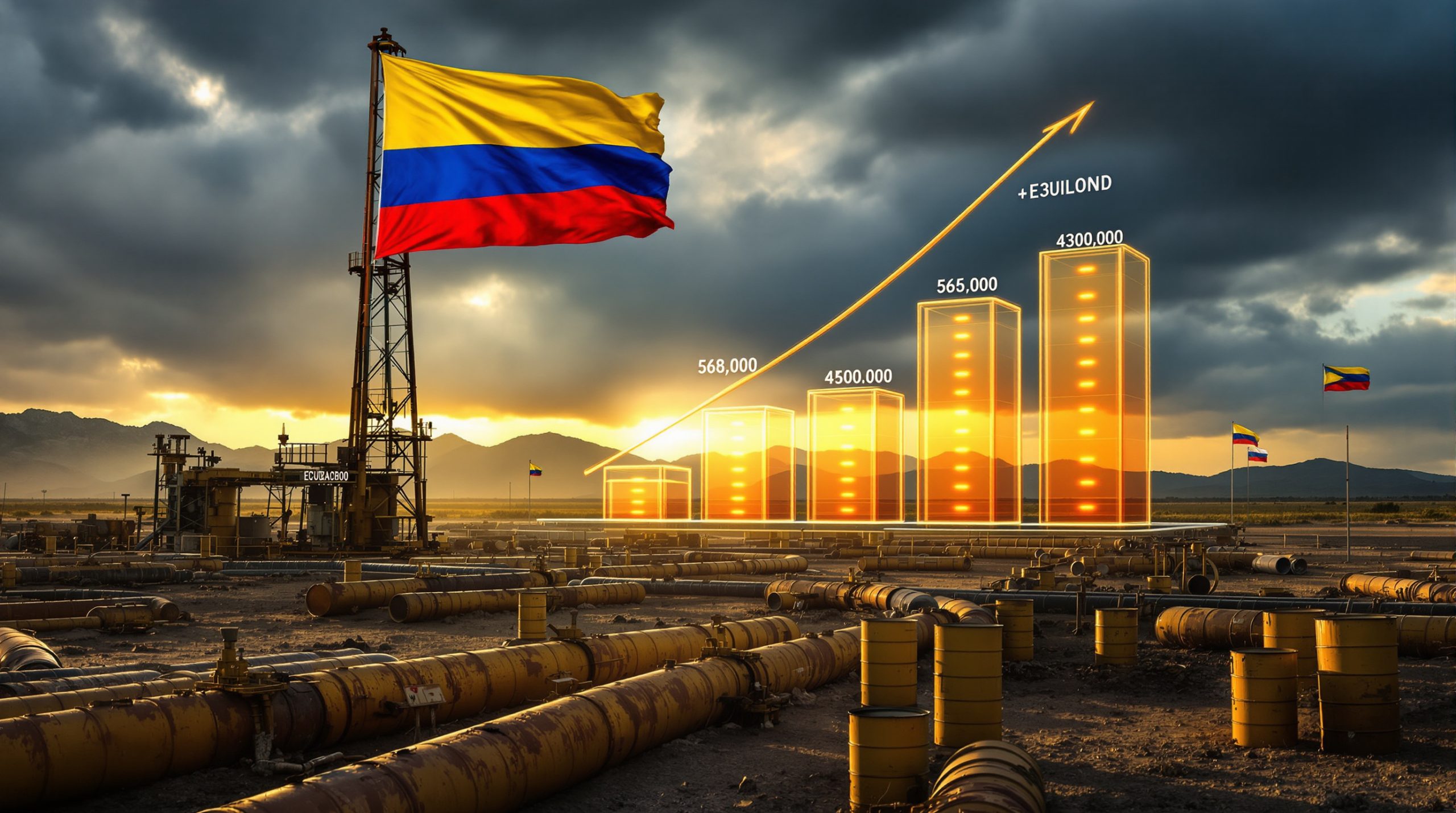Understanding Venezuela's Strategic Pivot to Coal Mining
Venezuela's mineral wealth extends far beyond its famous oil reserves, encompassing approximately 806 million short tons of coal deposits that have become increasingly vital as the nation navigates ongoing petroleum sanctions. This strategic shift represents a fundamental restructuring of the country's energy export priorities, positioning Venezuela revives coal as a critical revenue generator when traditional oil markets remain largely inaccessible.
The transition reflects broader economic adaptation strategies employed by resource-rich nations facing international restrictions. Unlike oil extraction, which requires sophisticated refining infrastructure and established global distribution networks, coal mining operations can be scaled more rapidly with existing domestic capabilities and alternative international partnerships.
Key Coal Reserve Locations and Geological Advantages
Venezuela's coal deposits are primarily concentrated in specific geological formations that offer distinct extraction advantages. The Zulia state region contains significant bituminous coal reserves, while additional deposits span across multiple states, providing geographic diversification for mining operations.
These geological formations benefit from relatively shallow depths and favourable mining conditions, reducing extraction costs compared to deeper coal seams found in other global markets. Furthermore, the proximity to existing transportation infrastructure enhances the economic viability of expanded coal production.
What Economic Factors Drive Venezuela's Coal Revival Strategy?
The economic rationale behind Venezuela's coal focus stems from multiple converging factors that make this mineral particularly attractive under current circumstances. Coal markets operate through different international trading mechanisms than petroleum, offering alternative pathways to global buyers despite existing sanctions frameworks.
Revenue Generation Potential:
- Coal exports can generate immediate foreign currency earnings
- Lower infrastructure requirements compared to oil refining
- Established international demand from steel and power generation sectors
- Reduced dependency on complex financial instruments affected by sanctions
International Market Opportunities and Trade Routes
Global coal demand remains substantial, particularly from developing economies expanding their industrial capacity. Asian markets, including steel producers and power generation facilities, continue seeking reliable coal suppliers, creating opportunities for Venezuelan exports through alternative trade arrangements.
The geographic positioning of Venezuela revives coal reserves allows for efficient shipping routes to both Atlantic and Pacific markets, providing flexibility in destination selection based on prevailing market conditions and geopolitical considerations.
How Does the Orinoco Mining Arc Support Coal Development?
The Orinoco Mining Arc initiative encompasses approximately 112,000 square kilometres across Bolívar and Amazonas states, creating a comprehensive framework for mineral extraction that includes coal alongside gold, bauxite, and coltan deposits. This massive development zone represents one of Latin America's most ambitious mining projects.
Within this framework, coal extraction benefits from streamlined regulatory processes for mining operations. Additionally, coordinated infrastructure development across multiple mineral sectors enhances overall efficiency. Foreign investment incentives designed to attract international mining companies further support development, while integrated transportation and logistics planning optimises operational capabilities.
Infrastructure Development and Modernisation Efforts
Recent infrastructure investments focus on upgrading mining equipment, improving transportation networks, and establishing processing facilities that can handle increased coal production volumes. These modernisation efforts address decades of underinvestment that limited the sector's potential.
New agreements with international partners include technology transfers and equipment upgrades specifically designed to enhance coal extraction efficiency. Moreover, these partnerships ensure operations meet contemporary environmental and safety standards through mining operations modernisation.
What Challenges Face Venezuela's Coal Industry Revival?
Despite strategic advantages, Venezuela revives coal sector confronts significant operational and structural challenges that impact production scaling and international market access. These obstacles require systematic addressing to achieve sustainable growth in coal exports.
Primary Operational Challenges:
| Challenge Category | Specific Issues | Impact Level |
|---|---|---|
| Infrastructure | Aging mining equipment, transportation bottlenecks | High |
| Energy Supply | Unreliable electricity for mining operations | Medium |
| Security | Illegal mining activities, territorial disputes | High |
| Investment | Limited access to international financing | Medium |
| Environmental | Regulatory compliance, community relations | Medium |
Security and Governance Issues
Illegal mining operations in coal-rich regions create complex security challenges that affect legitimate extraction activities. These unauthorised operations often lack proper safety protocols and environmental controls, potentially damaging the reputation of Venezuelan coal in international markets.
Government efforts to establish control over mining territories involve coordination between military, regulatory, and commercial entities. Consequently, legitimate operations can proceed while addressing unauthorised activities through comprehensive territorial management strategies.
Which International Partners Support Venezuela's Coal Expansion?
Venezuela has established strategic partnerships with various international companies and governments to support coal sector development. These partnerships focus on entities that can navigate current geopolitical complexities while providing necessary technical expertise and market access.
These partnerships typically involve technology transfer agreements for modern mining equipment and joint venture arrangements for large-scale extraction projects. Furthermore, long-term supply contracts with international buyers provide market stability, while infrastructure development financing operates through alternative mechanisms.
Regional Trade Relationships and Export Markets
Regional trade relationships within Latin America provide important market opportunities for Venezuelan coal, particularly with countries expanding their industrial capacity. These relationships often operate through bilateral agreements that facilitate trade despite broader international restrictions.
Additionally, emerging markets in Africa and Asia represent growing opportunities for coal exports. However, these markets particularly value coal for steel production and power generation applications where Venezuelan coal grades meet technical requirements.
How Does Coal Production Compare to Venezuela's Oil Sector?
The coal industry offers several operational advantages compared to oil production under current circumstances. These include lower technological barriers, reduced infrastructure requirements, and more diverse international market access options.
Comparative Analysis:
Production Flexibility: Coal mining operations can be scaled up or down more rapidly than oil extraction, allowing responsive adjustment to market conditions and international demand fluctuations.
Investment Requirements:
Coal mining typically requires lower upfront capital investment compared to oil field development and refining infrastructure. Consequently, this makes it more accessible for immediate revenue generation.
Market Access:
Coal markets operate through different international trading mechanisms than petroleum, potentially providing alternative pathways to global buyers despite existing sanctions frameworks.
Employment and Economic Impact Potential
Coal sector expansion creates direct employment opportunities in mining operations, transportation, and processing facilities. In addition, it generates indirect economic benefits through supply chain activities and local service provision.
The labour-intensive nature of coal mining provides employment alternatives for workers previously dependent on oil sector activities. Furthermore, this supports economic diversification goals while maintaining energy sector expertise within the workforce.
What Environmental and Social Considerations Affect Coal Revival?
Environmental stewardship represents a critical component of Venezuela revives coal development strategy, particularly given international scrutiny of mining operations in ecologically sensitive regions. Sustainable mining practices become essential for maintaining international market access and community support.
Key Environmental Priorities:
- Water resource protection in mining areas
- Air quality management around extraction sites
- Biodiversity conservation in mining concessions
- Waste management and site rehabilitation protocols
Community Relations and Social Impact Management
Successful coal development requires positive relationships with local communities, including indigenous populations in some mining areas. These relationships involve consultation processes, benefit-sharing arrangements, and employment opportunities for local residents.
Social impact management includes healthcare, education, and infrastructure improvements in mining communities. As a result, these initiatives create long-term development benefits beyond immediate extraction activities.
What Future Prospects Exist for Venezuela's Coal Industry?
Long-term projections for Venezuela revives coal sector suggest significant growth potential, particularly if international market conditions evolve favourably and domestic infrastructure development continues. The industry's future depends on successful navigation of current challenges while building sustainable operational capacity.
Growth Scenarios:
- Optimistic projections suggest coal could become a major export revenue source within 3-5 years
- Conservative estimates focus on gradual capacity building and market development
- International market evolution could create additional opportunities for specialised coal grades
Technology Integration and Innovation Opportunities
Modern mining technologies offer opportunities to enhance extraction efficiency while reducing environmental impact. These innovations include automated mining equipment, advanced geological surveying, and improved processing techniques that maximise coal quality and market value.
Investment in technological advancement positions Venezuela revives coal industry for long-term competitiveness in global markets. Moreover, this becomes particularly important as international buyers increasingly prioritise suppliers with modern, environmentally responsible operations.
Mining Equipment and Operational Challenges
The coal mining sector requires specialised equipment capable of handling the specific geological conditions found in Venezuelan deposits. Surface mining operations dominate the extraction landscape, utilising draglines, excavators, and haul trucks designed for bituminous coal removal.
Equipment Requirements:
- Heavy-duty excavators for overburden removal
- Specialised coal handling systems for processing
- Transportation infrastructure including conveyor systems
- Environmental monitoring equipment for compliance
The maintenance and operation of this equipment presents ongoing challenges in Venezuela's economic environment. Access to spare parts, technical expertise, and foreign currency for equipment purchases remains constrained, creating additional operational complexities.
Coal Quality and Market Specifications
Venezuelan coal deposits exhibit varying quality characteristics that influence their market positioning and pricing. The bituminous coal found in primary extraction areas typically contains sulphur levels ranging from 0.5% to 2.5%, making it suitable for both thermal and metallurgical applications.
Technical Specifications:
- Heating value: 10,500 to 13,500 BTU per pound
- Ash content: 8% to 15% depending on processing
- Moisture content: 6% to 12% after preparation
- Volatile matter: 25% to 35% by weight
These characteristics position Venezuelan coal competitively in international markets, particularly for steel production where consistent quality and chemical composition prove essential for metallurgical processes.
Transportation Infrastructure and Logistics
Coal transportation from mining sites to export terminals requires robust infrastructure capable of handling millions of tons annually. Current rail networks connecting mining regions to coastal ports operate below optimal capacity due to maintenance backlogs and equipment shortages.
The primary transportation routes include rail connections from Zulia state to Puerto Bolívar, trucking networks for shorter distances and mine-to-rail transfers, and river barging along navigable waterways where feasible. Additionally, port facilities require upgrades for efficient bulk handling.
Modernisation of these transportation systems becomes critical for scaling coal exports to meet international demand and maintain competitive delivery schedules.
Market Psychology and Investment Climate
International investor sentiment toward Venezuelan coal projects reflects broader geopolitical considerations and risk assessment frameworks. Mining companies evaluate opportunities based on resource quality, infrastructure access, regulatory stability, and long-term contract enforceability.
Investment Decision Factors:
- Political risk insurance availability
- Currency convertibility and profit repatriation mechanisms
- Environmental permitting and compliance costs
- Security conditions in mining regions
Despite challenges, the substantial resource base and growing global energy demand create compelling economic fundamentals. These factors attract specialised mining investors willing to navigate complex operating environments.
Regulatory Framework and Compliance Requirements
Mining operations within the Orinoco Mining Arc operate under specific regulatory provisions designed to streamline permitting while maintaining environmental and social standards. These regulations establish requirements for environmental impact assessments, community consultation processes, and ongoing monitoring obligations.
Regulatory Compliance Areas:
- Water use permits and discharge standards
- Air quality monitoring and emission controls
- Waste management and site reclamation bonds
- Worker safety and health protection protocols
International mining companies typically implement additional voluntary standards that exceed local requirements. For instance, these enhanced protocols particularly focus on environmental management and community engagement practices.
Geological Surveys and Resource Assessment
Recent geological surveys indicate that Venezuela revives coal reserves extend beyond previously mapped deposits. Exploration activities identify additional seams in remote areas using modern techniques including satellite imagery analysis, ground-penetrating radar, and core sampling programmes.
Exploration Results:
- Identified coal seam depths ranging from 50 to 300 metres
- Reserve calculations based on proven and probable classifications
- Quality assessments confirming export-grade specifications
- Overburden ratios indicating economically viable strip mining potential
The comprehensive geological database supports long-term production planning and provides confidence for international investment decisions in coal sector development.
How Does Coal Revival Fit Venezuela's Broader Economic Strategy?
Coal development represents one component of Venezuela revives comprehensive economic diversification strategy, designed to reduce dependency on oil revenues while leveraging the country's abundant natural resources. This approach aims to create multiple revenue streams that can support economic stability despite external pressures.
The integration of coal development with other mining activities under the Orinoco Mining Arc creates synergies in infrastructure, logistics, and international marketing. These synergies enhance overall sector efficiency and profitability potential. The strategy aligns with broader mining industry evolution trends while addressing coal supply challenges in global markets.
Furthermore, this development approach helps mitigate commodities market volatility through diversified mineral production. The Venezuelan coal sector draws lessons from successful South African coal mining operations while adapting strategies to local conditions.
Venezuela revives coal industry stands positioned to become a significant contributor to national economic recovery and long-term sustainability through strategic resource development and international partnership arrangements. The sector's success depends on effective implementation of modernisation plans and continued international market access despite geopolitical challenges.
For those interested in understanding broader energy policy frameworks, Venezuela's energy policy evolution provides valuable context for these coal development initiatives. Additionally, recent analysis of Venezuelan energy market dynamics offers insights into the strategic rationale behind this resource diversification approach.
Could Venezuela's Coal Revival Signal Broader Mining Opportunities?
Discovery Alert's proprietary Discovery IQ model identifies significant mineral discoveries across global markets, helping subscribers capitalise on emerging opportunities like Venezuela's strategic shift from oil to coal mining. Explore how major discoveries have generated exceptional returns by visiting Discovery Alert's discoveries page and begin your 30-day free trial to gain immediate insights into actionable mining investment opportunities.




